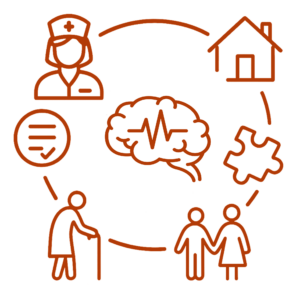
Olofsson S, Gustafsson A, Westerlund A-M, Strid L, Pettersson I, Steen Carlsson K
Vård och omsorg för personer med demenssjukdom i Västernorrland – en kartläggning av potentiell nytta med multidisciplinärt organisationsöverskridande demensteam
The report is written in Swedish with a summary in English
In Västernorrland, there are plans to test a new approach to care for people with dementia. The purpose of the assignment described in this report (specialization in health economics) is to support dementia work with a focus on benefits from a societal perspective when new approaches are tested and introduced.
In a first step, three case studies were developed by the project’s steering group. Then, three digital focus groups were conducted with representatives of the region, municipality and relatives. In the focus groups, challenges with the current situation were discussed, based on the three case studies, to identify where the major resource requirements and quality of life losses arise. In a second step, a framework was created for identifying consequences from a societal perspective and with a focus on different stages in the development of dementia. Then, a workshop was physically held on site in Örnsköldsvik, where all members of the project’s working group participated, including all those who had participated in the focus groups. In a third step, a brief literature review was conducted.
The results show that there is a significant burden on various actors with the current system that could be affected by a new way of working. For healthcare, a lack of coordination leads, for example, to people with dementia needing increased healthcare even before diagnosis (e.g. due to falls, nutritional deficiencies, incorrect medication). For municipal care, a lack of coordination leads, among other things, to them having limited opportunities to implement the right interventions at the right time. It was pointed out, among other things, that municipal care would like to see day care services implemented for more people, but that this is made impossible by them learning about the diagnosis at too late a stage. For people with dementia, a lack of coordination can lead to a poorer quality of life and poorer health as it can lead to their needs not being identified in time (late diagnosis, lack of follow-up) and interventions (e.g. day care, healthcare) being implemented too late.
There were recurring suggestions on what would need to change to improve the situation. This is summarized in this report as: consent – need for clearer guidelines, confidentiality – investigate when information transfer can be allowed, coordination – need for meetings between region and municipality and better communication channels, visibility – routines for detecting people with dementia and their needs, especially living alone, specialization – opportunity to specialize in people with dementia in health and care to enable better treatment. Some of these proposals are already within the framework of the new working method, while some may need additional measures to be fully realized (visibility and specialization).
In summary, this report shows that there is potential for benefits with a new working method for several actors. These benefits arise in most cases indirectly (e.g. as a result of better well-being which in turn leads to a reduced need for care), over a longer period of time and in different ways for different individuals (e.g. depending on other morbidity and whether there is a relative who can provide care or not). Quantification of these benefits therefore needs to be done with a control group, in the longer term and in a larger group.
IHE RAPPORT 2025:10, IHE: Lund
